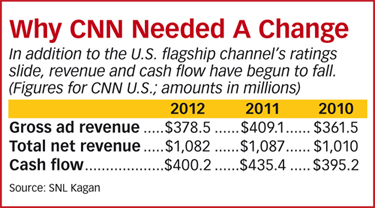Job One for Zucker: Reverse CNN's Ad Revenue Woes

The smarter way to stay on top of broadcasting and cable industry. Sign up below
You are now subscribed
Your newsletter sign-up was successful
If Jeff Zucker succeeds in reviving CNN's
primetime programming, its domestic advertising revenues will eventually
reverse, improving the network's financial picture. And at that point, the
former NBCUniversal CEO could be looking at a bigger job at his new company.
Zucker, a TV news wunderkind who put the Today show
on a remarkable winning streak, was-after numerous reports-named president of
CNN Worldwide last week by Turner Broadcasting CEO Phil Kent.
Even before he starts his new job in January, there is
speculation at Turner that Zucker has his eyes on a bigger job, possibly
running Turner when Kent retires.
For that to happen, he must deliver on improving primetime
ratings, one of his priorities. CNN's ratings have been sliding for a while, with
the original cable news network falling behind first Fox News Channel and then
MSNBC in primetime viewership.
For a while, ad revenue held up. But now, after hitting
20-year lows in primetime ratings earlier this year, the domestic network's
performance is affecting CNN's revenues and profits, creating issues for Jeff
Bewkes, CEO of Turner parent Time Warner, who has had to address plans for
turning around CNN on recent conference calls with analysts.
CNN will finish 2012 with domestic gross ad revenue of
$378.5 million, down 7% from 2011 despite the big spending associated with an
election year, according to figures compiled by research company SNL Kagan.
CNN's ad total is also down from its peak of $427.7 million in 2008, the prior
presidential election year.
The decline in ad sales more than offset increases in
affiliate revenue, leaving CNN's total net revenues for 2012 at $1.082 billion,
down a bit from 2011. Its cash flow was down 9% to $400.2 million in 2012,
according to SNL Kagan.
The smarter way to stay on top of broadcasting and cable industry. Sign up below
Fox News' ad revenue climbed 12% for 2012 to $838.8 million,
and its cash flow jumped 8% to $956.5 million, according to Kagan. At MSNBC, ad
revenue rose 8% to $277 million, helping to hike cash flow 4% to $204 million.
"They are in trouble," Kagan analyst Derek Baine said of
CNN, adding that things could be much worse. "They still have a strong brand
name with advertisers, and many of their core customers have stuck with them
despite the ratings problems."
Gary Carr, executive director of national broadcast at media
buyer TargetCast tcm, said: "CNN is still attractive and still gets bought.
Ratings are lower, so they don't get the same unit costs." Carr said CNN used
to get a premium rate. And when news broke, the network would over-deliver and
try to take back units. "They're much easier to work with now."
Carr said CNN is still a great news organization that he
tunes in when news breaks. Hiring Zucker is a big deal, he added, because as a
former producer, this job puts him "back in his wheelhouse."
Kagan's ad revenue figures do not include digital, but
multiplatform sales have become a big part of CNN's business. During a
conference call announcing his new job at CNN, Zucker noted that as a
competitor and a consumer, he was envious of CNN's digital assets: "They were
there first with online and mobile and had a huge advantage that has been borne
out in its continued success." Zucker said he wanted to leverage CNN's digital
success and integrate with its other platforms, turning users of CNN online and
mobile into television viewers as well.
Advertising isn't CNN's only source of revenue, and Bewkes
has told analysts Turner will be pushing for big subscriber fee increases over
the next few years. To do that, CNN will need to improve its programming
performance.
On the conference call, Kent said that while ratings are an
important currency, they're not the only thing to pay-TV operators. CNN is
must-have programming when news breaks, but the network also needs to do the
kind of programming that develops a pocket of hardcore fans who will watch the
channel more often, he said, adding, "The most important thing is to be
essential every day to someone."
At NBCU, Zucker ran a very large organization with cable
networks, movie studios and theme parks. Despite presiding over the decline of
NBC's primetime schedule, he's qualified for a bigger job at Turner and Time
Warner.
People familiar with the company speculated that Zucker's
arrival at Time Warner could upend Kent's succession plans, which have had
David Levy as the top candidate. Levy oversees revenue generation as president
of ad sales, distribution and sports.
Whether Zucker has already been promised the job, or whether
he'll have to earn it, is not clear. But given Turner's culture, and the long
tenure of many of the company's top executives, the big news could mean change
is in the air.
Jon has been business editor of Broadcasting+Cable since 2010. He focuses on revenue-generating activities, including advertising and distribution, as well as executive intrigue and merger and acquisition activity. Just about any story is fair game, if a dollar sign can make its way into the article. Before B+C, Jon covered the industry for TVWeek, Cable World, Electronic Media, Advertising Age and The New York Post. A native New Yorker, Jon is hiding in plain sight in the suburbs of Chicago.

